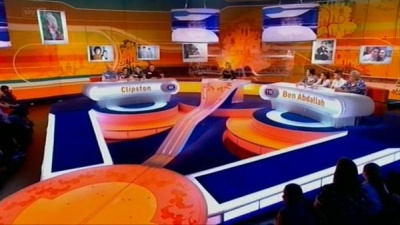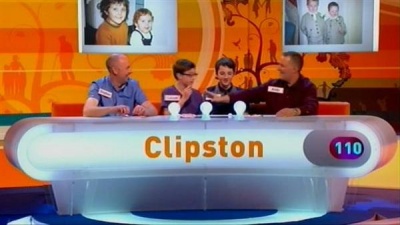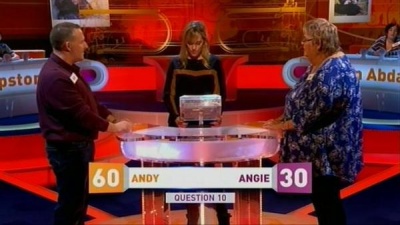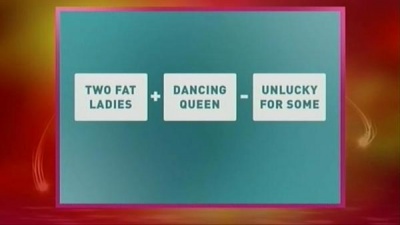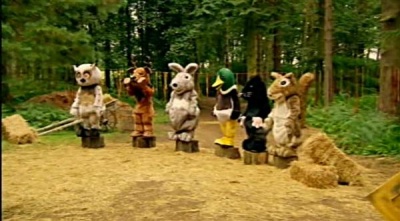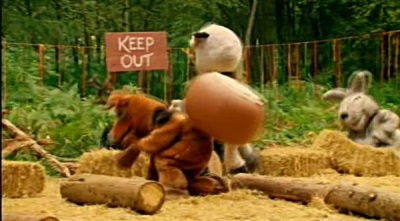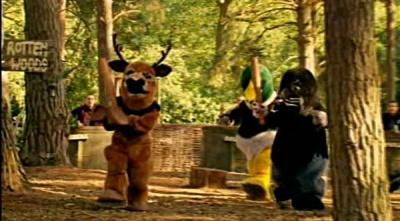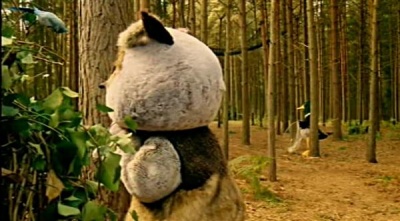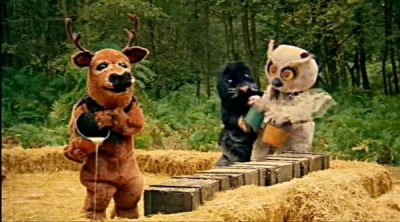Weaver's Week 2015-05-17
Last week | Weaver's Week Index | Next week
We don't mean to turn into a column that goes on about Mel Giedroyc and Silly Costumes every week, but that's what we're doing. Next week, the semi-finals of the Eurovision Song Contest are hosted by her from the cake show and will feature some very daft clothes. This week, two shows from the heavens.
Contents |
Relatively Clever
John Stanley Productions for The Satellite Channel, 3 April – 15 May
A quiz for smart families, Relatively Clever also works as a gentle entertainment.
Competing are two families of four: two children aged 10-16, and two older relatives. Not necessarily parents, they can include a grandparent, an aunt, or a cousin. The team will usually share a surname, and they'll be known by this name. Meet the Smiths, or the Taylors, or the Giedroycs.
The players sit behind long desks, each person has a buzzer of their own. A quiz wouldn't be a quiz without plenty of questions, and Relatively Clever has plenty of questions. Nothing too taxing, this is a mass-appeal quiz, but the questions aren't so obvious as (say) In It to Win It. All the questions are short and snappy, there are no life stories like on University Challenge, but there are some with the key word hidden at the end.
First player to buzz in on a question can answer it, without conferring. Wrong answers are thrown to the other team, who are allowed to confer. Whoever gives a correct answer is rewarded with 10 points, and one of the lightbulbs on their desk lights up. These "pips", as Mel calls them, are the key to advance success. Whichever family can light all three bulbs first will win an Advanced Question.
This Advanced Question might be a picture question, or a sound clip, or a word game. Which word fits into these blanks? What's the link between these pictures? What's the sum of these numbers? Pencil and paper to hand, the family has 45 seconds to work together, confer, and eventually call out an answer. Twenty points for a correct response, nothing for anything else, and the Advanced Question will not be thrown over for a bonus. Afterwards, both families' "pips" are extinguished, and we begin again.
After about six minutes of this, and at least two Advanced Questions, the gong goes. End of the contest? Not likely! We're going in to the first Head-to-Head round. Mel gives a broad subject, such as "Entertainment" or "Geography", and each family nominates one member to play it. We might have two children tackling Television, we might have two grannies doing battle over History. More fun, we'll usually have a generation clash, will Father or Elder Child know more about Music?
Head-to-Head is played at the front of the set, by special buzzers. Ten questions in the round, ten points for each right answer. The questions run from simple tests of reflex ("On the banks of the Danube, what is the capital city of Austria?") to some quite obscure knowledge ("what is the formal name for the Chelsea Pensioners?").
After this round finishes, we have a commercial break, and then part two is a carbon copy of part one. Buzzer questions, three right answers earns an Advanced Question, later a Head-to-Head.
Part three follows a similar format, except the questions here have (at least) four correct answers. Beginning with the player who buzzes in, each member of their family is to give one answer. A correct response from all players earns ten points. Quite mean reward for such hard work. Get any part wrong, and the opposing family is allowed to confer and bring the total up to four right answers. First family to get three right answers earns an Advanced Question, and there's rarely time for a second AQ before the Head-to-Head.
A final head-to-head begins part four. Then it's out with the pips, and in to a concluding general knowledge round. Three minutes of rapid-fire questions on the buzzers, played for double points. Almost without exception, the winner of this round will win the contest – either by pulling further ahead or overcoming a lead.
Mel Giedroyc is not fully used as a host. Yes, she sparkles, she has a quick wit, she exudes warmth and charm. But we get the feeling that many other hosts have these qualities, and Mel got the gig because they wanted a recognisable Name on the show.
There is one thing wrong with Relatively Clever: we cannot see who has buzzed in. No spotlights, no little lights on the desk. That is the one complaint we have, and it's trivial.
Relatively Clever is gentle and unthreatening. The questions are fair, the format is tried and true, and a dominant team will always win. But these strengths are the show's weakness: it's soft, safe television, the questions tend to be quiz chestnuts. For quizzers, only the Advanced Questions stand out from the crowd.
For the KYTV channel, this is just right: the show is safe enough to repel no-one. Viewers can stumble across this programme and leave it on, secure that it's the nice lady from the baking show, asking gentle questions to families like us. If only they'd made this programme in 1989, when it was similar to quizzes on BBC1.
Wild Things
IWC / Group M / Mad Monk for The Satellite Channel, 15 March – 19 April
My Little Princess went out on E4 in early 2013. For one event, some of the competitors dressed up in oversized animal costumes – large mice, or chickens. They couldn't see a thing. But they could run at each other, and whichever one didn't get the cheese, or pulled out of the impact, was the loser.
Now, My Little Princess was a flop programme. Viewing figures fell from 250,000 to under 100,000, the series was burned off at 1am and not renewed. But it had one thing going for it. The show came from the brain of Gary Monaghan, a place where even we fear to tread. A place where innocent television ideas grow into twisted programmes. A place where failure is never final, it is deferred success.
Two years later, we go to a forest far, far away. Enter the duck. And the fox. And the mole, badger, owl, and deer. Six grown people, in oversized animal costumes. None of them can see a thing. But they can follow instructions, shouted by their friend and team-mate, or relayed through an earpiece.
Six animals enter, but only four can go through to the first round proper. Like a game of Going for Gold, the show begins with a Beat the Badger round. An obstacle course, guiding through a slalom, past some moving chestnuts, and eventually through the gate. And, because this is a Gary Monaghan show, all done to some silly music – in this case, a comedy version of "In the hall of the mountain king".
Only at this point do we meet the teams. Who is the human? Who is inside the costume? We can hear them, but they're going to remain in costume throughout. After the first look at the map of the Wild Woods, we're into the opening game. For our money, the show peaked in the opening week, when a giant mole and a giant duck beat up a giant stag while attempting to smash rotten fruit to the ground.
Then the map takes us to the Tree of Knowledge, which gives questions in blank verse. A correct answer will be rewarded by gold rings, and incorrect answers will see people taken from behind by thrall demons — hang on, that's Raven. This is the Wise Old Tree, where players stand on ledges and if they're wrong, they'll be knocked off into the mud by their own team-mate. And, because this is a Gary Monaghan show, all done to the theme from The Flumps.
For at least one of the games, the human partner is in an awkward situation. For instance, the human is caught in a bog. The human can see a series of ten colours, and is to remember them. An error will trip a mine, and will blow the animal sky high. Best performance wins. Another game is pure It's a Knockout, gathering swill and throwing it to their partner on a revolving platform.
Jason Byrne, an Irish comedian, gives a droll commentary on the events. Kate Humble, a wildlife expert, helps him to top and tail the show. Games are demonstrated by paper animations.
The final game is the same each week. The winning team is given a suitcase containing £10,000. The animal is told to aim for a gate and then find a target, and 30 seconds to run to it. Make it in time, marvellous, that £10,000 is yours. Otherwise the winning animal stops, and the other three animals are allowed to chase for half a minute. Catch up with the suitcase and that animal bags it. Then whoever's got the case has 30 seconds to move.
And, of course, the animals cannot see a thing. They're guided by their playing partner, through televisions and walkie-talkies. It's a properly tense final game, where no side is out until they're out. Dare we say it, more tense and fun than the end of My Little Princess. And, because this is a Gary Monaghan show, all done to a cheesy orchestral version of "Thriller".
After the final round, there's one last revelation: the players in costume are able to remove their heads and give their final thoughts.
Games were mixed up from week to week, always four scored efforts between the opening obstacle race and the closing pursuit. The quiz elements felt a little out of place sometimes, but boredom was unlikely when the punishment for a wrong answer is a gunging. There was a little violence, stuffed animals clobbering each other with wooden sticks is more comedy than scare, even for the youngest viewers.
By going out at 7pm Sunday, it's aimed at young viewers – something for children of seven to see before they head to bed. A version for older viewers, containing more rude language, went out at 10pm Thursday. It was called "Wild Things: Absolutely Livid". Right, Gerald?
Wild Things is a light entertainment. It asks deep questions: what is it like to be without sight? Can you communicate effectively with your nearest and dearest by voice alone? And it asks these questions in a gentle way, always putting the entertainment first.
A lot of people wrote to UKGameshows asking how to get on Wild Things. This tells us two things: 1) there will be plenty of contestants for a second series, and 2) there are lots of people who want a second series. Hint.
This Week and Next
Democracy season continued with the BAFTA Television Awards. Saturday Night Takeaway won the entertainment programme award, with Ant and Dec taking the entertainment performance prize.
Remarkable scenes on BBC Young Dancer last weekend. It's the live final, all the contestants are queued up waiting to find out if they've won. Zoe Ball, host for the night, invites one of the judging panel to step forward and announce the winner.
"Who did we say won?" "How do you say the name?" The programme collapses into laughter, the serious moment is completely lost. The words that couldn't escape lips: Connor Scott.
We hope for a less chaotic conclusion to the Eurovision Song Contest next weekend. Ewan Spence has given some pointers on what to look for, in "Every Song a Story". Four video essays cover framing, storyboards, left-centre-and-right, and some examples of what not to do. The clips include footage of Meat Loaf, and Bonnie Tyler.
That's My Cobble. Shayne Ward is heading back to Trafford, where he will appear in the popular ITV soap Coronation Street. It's one of the very few programmes more popular than The X Factor, which Mr. Ward won in 2005.
Speaking of X Factor contestants, this column saw Lucy Spraggan in concert last night. Recommended.
Over in Yankeeland, we hear that Pop Idle Us is coming to an end. The show has been running since 2002, and next spring's series will crown the 15th winner. The show has launched few international stars – Kelly Clarkson is famous around the world, Carrie Underwood leads in the country and western scene, Jennifer Hudson and Adam Lambert achieved success for reasons other than their singing. But compare this to winners of The Voice of Us, as unsuccessful in the UK as winners of The Voice of UK.
Anyway, we hear that Simon Cowell will still have a programme on the Fox network. The great Red or Black? revival starts here.
BARB ratings in the week to 3 May
- Britain's Got Talent remains the most popular show of all, 9.25m saw this week's heats.
- Have I Got News for You (4.5m) and Pointless Celebrities (4.35m) both move down, and Ninja Warrior moves up to 4.25m.
- Play to the Whistle continues to stumble, 2.31m saw the edition we reviewed last week, and 2.3m couldn't tell you what happened.
- New 8 Out of 10 Cats Does Countdown (1.3m) beat repeated Eggheads (1.1m), but not Britain's Got More Talent (1.4m on ITV2).
- Playing catchup: 207,000 people shifted Tipping Point to ITV+1, and 48,000 saw Knightmare on Challenge +1.
It's the Eurovision Song Contest (BBC3 and RTE2, Tue and Thu; BBC1 and RTE1, Sat), with the return of Radio 2 Eurovision (from Thu), and a high-art documentary on BBC4 (Fri). Elsewhere, A League of Their Own comes back (The Satellite Channel, Fri). And we'll be back on Saturday with the Eurovision Song Contest semi-finals.
Photo credits: John Stanley Productions, IWC/Mad Monk.
To have Weaver's Week emailed to you on publication day, receive our exclusive TV roundup of the game shows in the week ahead, and chat to other ukgameshows.com readers, sign up to our Yahoo! Group.


